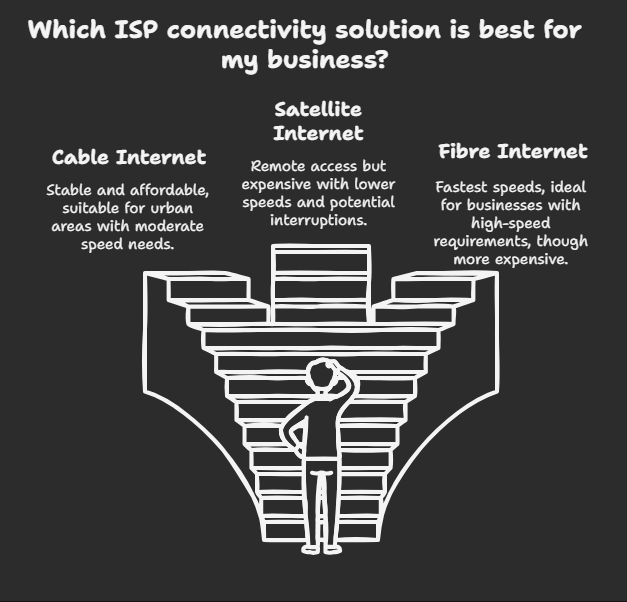What Is the Difference Between Telco & ISP?
2023-01-24 15:34:27

Did you know that 60% of the world's population now regularly uses the internet? Despite this fact, there is still a lot of confusion surrounding connectivity terms.
Two common ones that people often confuse are Telcos and ISPs. So, what's the difference between Telco and ISP? If you want to learn the answer to this question, and more, you're in the right place.
In this guide, we'll break down everything you need to know about these two important connectivity terms. Let's get started!
What Is Telco?
Telco is a term that has changed and evolved with the industry. Telco was first introduced by a telephone company. This company used twisted pair cables to transmit data; in addition to phone services, the company also offered internet.
In the past, dial-up internet connections were completely dependent on telephone lines. So, it makes sense that a telephone company would have an early investment in it.
But times have changed, and dial-up internet has been replaced. As such, the term Telco is now generally used to describe telecommunication service providers.
These are local telephone companies that provide both landline and wireless cellphone services. However, it can be more nuanced than that as well.
Sometimes, Telco is used to describe a communications provider that offers a holistic combination of cellphone, landline, and internet services using twisted pair cables.
Telco companies are important for businesses because they offer a wide range of features that can help grow the company. These include things like three-way calling, extensions calling, hunt groups, and auto-attendant.
What Is ISP?
As the internet grew in popularity, many Telco providers switched entirely to internet services. These companies became known as ISPs, or internet service providers.
As the name suggests, these are companies that provide you and your business with access to the internet. You can typically break down internet service providers by the different types of internet service that they provide.
The three most common ones seen today include cable internet providers, fibre internet providers, and satellite internet providers. Remember that each of these different types comes with its own speed rates, pricing, and equipment that's needed to connect.
Well, go over these different types of ISPs in another section. For now, let's take a closer look at the difference between Telco and ISP.
What Is the Difference Between Telco and ISP?
It can be confusing to understand the difference between Telco and ISP. So, let's break it down into a simple analogy. You can think of Telco as the highway and ISP as the car that you use to drive on it.
Without the groundwork that twisted pair cables provided, the internet wouldn't have the infrastructure it needs to reach homes in South Africa. So, in that way, Telco is a precursor to ISPs.
However, Telco has also remained in the larger domain by providing telephone utility services. So, to make things simple, Telco these days is a telecommunication company that offers landline, cell phone, and network capabilities.
ISPs, on the other hand, only provide internet services. However, as we'll see in the next section, there is still a diverse range of ISP service types.
And keep in mind that there are companies like Daisy Business Solutions that offer both connectivity and telecom solutions for your business.
Different Types of ISP Connectivity Solutions
In the past, every internet provider relied on cables to deliver their connection to the internet. And, while cables are still used today, satellite internet and fibre internet are becoming increasingly popular.
So, let's take a closer look at some of the pros and cons of each of these internet types. That way, you can decide which one is best for your business communication needs.
Cable Internet
If you live in a major city, you've likely encountered cable internet before. This type of internet uses coaxial cables to deliver stable and fairly consistent speeds.
The specific speed will depend on what internet package you purchase. However, most of the time, cable connections will range between 50 to 300 Mbps.
That being said, they can be lower or higher. The biggest benefit of cable internet is that it's fairly stable and affordable.
Satellite Internet
If you live in a more rural area, away from the infrastructure required for cable or fibre, your only choice for the internet will likely be a satellite.
Unfortunately, the remote-reaching capabilities of the satellite are just about their only benefit. It's expensive, comes with lower speeds, and can be prone to interruption when bad weather comes through.
So, if you live in a city, you're likely better off going with cable or fibre internet.
You may also be able to supplement wireless internet usage. This is the internet that uses LTE, or 4G, mobile technology to deliver fairly impressive internet speeds.
Fibre Internet
Fibre internet is by far the fastest option out there. This type of connection uses fibre optic cables to deliver fast internet speeds that can reach up to several Gbps.
If your company relies on an internet connection and fast speeds to do business, this will likely be the best option for you.
Yes, it's more expensive than cable. But the good news is that prices are coming down since more providers are offering it.

Do You Require Net Capabilities? Contact Daisy Business Solutions
We hope this article helped you answer the question, "what is the difference between Telco and ISP?" Here at Daisy Business Solutions, we pride ourselves on our services and infrastructure related to connectivity and telecoms.
If you're ready to grow your business while letting professionals handle any solutions you need, we're the right fit for you.
Not only do we offer connectivity and telecom services but also print, financial, and energy solutions. So, contact us today to find out more about what our company can do for you.


